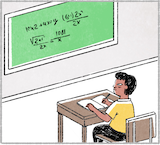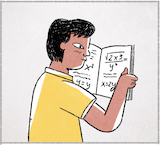


เขากำลังเฮ็ดหญัง กะมีเด็กน้อยพุซายคนหนึ่งเนาะ อาดสิเป็นเด็กน้อย อันนี้ หลือว่าอาดสิเป็นพุใหญ่แล้ว กะบ่ฮู้จัก กะแนมบ่ค่อยซัดปานใดเนาะ แนมบ่ค่อยเห็น เขากำลังเฮ็ดหญังอยู่ เขากำลังเลียนหนังสืออยู่ นั่งโต่ะอยู่ นั่งเก้าอี้อยู่เนาะ แล้วกะนั่งอยู่โต่ะนั้นหละ นั่งอยู่ข้างหน้าพ้อมเด๊ นั่งกำลังเลียนหนังสืออยู่
เขาเลียนวิชาหญังตอนนี้ อาดสิเป็นคะนิดตะสาดเนาะ อาดสิเป็นคะนิด เลียนคะนิดอยู่ เห็นเขามีโตเลขหลายๆ อาดสิเป็นกานคำนวน กะสิเกี่ยวกับคะนิดตะสาด วิชาคะนิดสาดเนาะ
แล้วเขาเลียนอยู่กับใผ เขากะเลียน อาดสิอยู่กับหมู่ อยู่หลายคน แต่ว่าใน[ที่]เห็นอยู่ตอนนี้คือเขานั่งอยู่โต่ะพุเดียว หมู่อาดสินั่งอยู่[ข้างหลัง] อาดสินั่งอยู่โต่ะข้างหลังเนาะ
มือข้างขวากะจับปากกา กำลังเขียนอยู่สะหมุดหนังสือเขาอยู่เนาะ
9
เขากำลังเฮ็ดหญัง กะมีพุซายพุหนึ่งเนาะ ใส่เสี้ยสีเหลียง กำลังอ่านหนังสืออยู่ อาดสิตั้งใจอ่านหนังสือเพื่อที่สิสอบ หลือว่าอ่านหนังสือเพื่อทบทวนความลู้ หลือว่าให้มันมีความลู้ในสะหมองเนาะ
เขาอ่านหนังสือเกี่ยวกับวิชาหญัง เบิ่งลักสะนะแล้วอาดสิเป็นกานคำนวน วิชาคะนิดตะสาดเนาะ หลือว่าคะนิด หญังที่มันเกี่ยวกับคำนวน หลือว่าฟิสิก หลือว่าอี่หยังกะได้เนาะ
10
แล้วเขากำลังเฮ็ดหญังอยู่ มีพุซายพุหนึ่งเนาะ เขากำลังจับหนังสืออ่านอยู่
เขาอ่านอยู่กับใผ กะจักคือกัน อันนี้เฮากะบ่ฮู้เนาะ เขาอาดสิอยู่พุเดียว หลือว่าอยู่บ้าน หลือว่าอยู่ในห้องเลียนของเขา
Link to overview page
Link to dictionary
| Isaan | Pronunciation | Tones | Thai | English/Notes |
|---|---|---|---|---|
| เขา | khao | M | เขา | personal pronoun: he, she |
| กำลัง | gam-laŋ | M-HR | กำลัง | auxiliary indicating continuous or progressive action |
| เฮ็ด | het | H | ทำ | to do, to make |
| หญัง | ɲaŋ | M | อะไร, เป็นหญัง = ทำไม | 1. what {เขากำลังเฮ็ดหญัง = What is he doing?} {ธูปเอาไว้เฮ็ดหญัง = What are incense sticks for?} 2. something, anything, (nothing) 3. เป็นหญัง[...]คือ in initial position: why {เป็นหญังเขาคือใส่บักพิกลงไปในกวยเตียว = Why is he putting chili in [his] noodle soup?} {เป็นหญังหน้าต่างมันคือเปิด = Why is the window open?} {เป็นหญังมันคือมีควนไฟ = Why is there smoke?} |
| กะ | ga | M | ก็ | 1. then, consequently 2. also |
| มี | mi: | HR | มี | 1. to have 2. there is |
| เด็กน้อย | dek-nɔ:i | M-HF | เด็ก, เด็กน้อย | child |
| พุซาย | phu-sa:i | H-HR | ผู้ชาย | man, male |
| คน | khon | HR | คน | person, people |
| หนึ่ง | nʉŋ | H | หนึ่ง | 1. one 2. after adjective: intensifier {บักคักหนึ่ง = very much} {อันบักใหญ่หนึ่ง = very large}, or attenuates the meaning {กะดาดมันแผ่นน้อยๆ หนึ่ง = the piece of paper is [relatively] small} |
| เนาะ | nɔ | H | เนาะ | final particle: makes the statement softer, looking for agreement |
| อาด | a:t | LF | อาจ | 1. might, may, will 2. likely |
| สิ | si | M | จะ | future tense auxiliary {เขากำลังสิตื่น = he's about to wake up} {สิไปตะหลาด = [I'm] going to the market} |
| เป็น | pen | M | เป็น | 1. to be, to exist 2. to be able to 3. to suffer, sth. happens to 4. เป็นหญัง[...]คือ in initial position: why? {เป็นหญังเขากะคือแปงฟัน = Why is he brushing his teeth?} {เป็นหญังเคี่ยงบินมันคือสิตก = Why is the airplane falling down?} |
| อัน | an | M | อัน | 1. thing, object 2. general clf. for objects |
| นี้ | ni: | HF | นี้ | 1. this 2. here |
| หลือ | lʉ: | M | หรือ | or |
| ว่า | wa: | H | ว่า | 1. that, as {คำว่า X = the word X} 2. to say |
| พุใหญ่ | phu-ɲai | H-H | ผู้ใหญ่ | adult, elder |
| แล้ว | lɛ:o | HF | แล้ว | 1. finished 2. already 3. and then, and next (especially แล้วกะ) 4. auxiliary for past tense |
| บ่ | bɔ: | H | ไม่ | 1. no, not 2. question particle, transforming a statement into a question Notes: spelling exception in line with common usage on social media |
| ฮู้จัก | hu:-jak | HF-M | รู้จัก | to know, to be acquainted with, to recognize |
| แนม | nɛ:m | HR | มอง | to look, to glance, to stare {เขากำลังยืนแนมก้อนหินอยู่ = he's standing and looking at the stone/rock} {ข้างหนึ่งแนมเห็น อีกข้างหนึ่งแนมบ่เห็น = [we] see one side, [we] can't/don't see the other side} |
| บ่ค่อย | bɔ:-khɔ:i | H-H | ไม่ค่อย | not so (much) {เบิ่งบ่ค่อยออก = I can't really see it clearly} |
| ซัด | sat | H | ชัด | 1. clear, distinct 2. clearly, distinctly |
| ปานใด | pa:n-dai | M-M | เท่าไหร่, มาก | 1. after negative: (not) very, (not) so much {บ่ใหญ่ปานใด = not so large, not very large} 2. how much, how many {เฮาบ่สามาดนับได้ว่ามันมีหลายปานใด = it's impossible to count how many there are} |
| เห็น | hen | M | เห็น | to see |
| อยู่ | yu: | H | อยู่ | 1. to be (located) at 2. yet, still 3. auxiliary indicating continuous or progressive action {ทอดปาอยู่ในกะทะ = (in the process of) frying a fish in the pan} {แม่กำลังเมี้ยนเฮียนอยู่ = mother is cleaning/tidying up the house} |
| เลียน | li:an | HR | เรียน | to study, to learn {เลียนหนังสือ = to study} {เลียนจบ = to graduate} {เลียนเก่ง = to be a good student} |
| หนังสือ | naŋ-sʉ: | M-M | หนังสือ | 1. book {เลียนหนังสือ = to study} 2. text {เขียนหนังสือ = to write sth.} Notes: sentence-final: often with rising tone which is likely a Thai influence |
| นั่ง | naŋ | H | นั่ง | to sit |
| โต่ะ | to | H | โต๊ะ, เก้าอี้ | 1. table 2. chair |
| เก้าอี้ | gao-i: | HF-HF | เก้าอี้ | chair |
| นั้นหละ | nan-la | HF-M | นั่นแหละ | auxiliary for emphasis at the end of a phrase |
| ข้างหน้า | kha:ŋ-na: | LF-LF | ข้างหน้า | in front, forward |
| พ้อม | phɔ:m | HF | พร้อม | at the same time, also, too {มีตะเว็นพ้อม = the sun's out, too} {กะทะมีด้ามพ้อม = the pan has also a handle} |
| เด๊ | de: | HR | น่ะ, ล่ะ | final particle, can have various meanings, e.g., making a statement softer, or forming a question similar to Thai ล่ะ, or adding emphasis |
| วิชา | wi-cha: | H-HR | วิชา | subject (e.g., at school) |
| ตอนนี้ | tɔ:n-ni: | M-HF | ตอนนี้ | now |
| คะนิดตะสาด | kha-nit-ta-sa:t | H-H-M-LF | คณิตศาสตร์ | mathematics |
| คะนิด | kha-nit | H-H | คณิตศาสตร์ | mathematics Notes: short for คะนิดตะสาด |
| โต | to: | M | ตัว | 1. body, self 2. clf. for animals, characters/letters/consonants, appliances, clothes (e.g., pairs of trousers, shirts) |
| เลข | le:k | HF | เลข | number |
| หลาย | la:i | M | เยอะ, มาก | many, much, very |
| กาน | ga:n | M | การ | prefix indicating the action of ... |
| คำนวน | kham-nu:an | HR-HR | คำนวณ | to calculate, to compute |
| เกี่ยวกับ | gi:ao-gap | H-M | เกี่ยวกับ | about, regarding, pertaining to |
| คะนิดสาด | kha-nit-sa:t | H-H-LF | คณิตศาสตร์ | mathematics Notes: short for คะนิดตะสาด |
| กับ | gap | M | กับ | 1. and {ลุงกับป้า = uncle and aunt} {กวยเตียวหมูกับกวยเตียวไก่ = noodle soup with pork and noodle soup with chicken} 2. with, to {ค้ายๆ กับคำว่า ... = similar to the word ...} 3. prefix in front of foods {กับเข้า = side dishes eaten with rice} {เขากินกับกวยเตียว = he's eating noodle soup} |
| ใผ | phai | M | ใคร | 1. who {พุซายคนนี้เป็นใผ = Who's this boy?} 2. somebody, someone, anybody, with negative: nobody {บ่มีใผอยู่หนี้จักคนเลย = there's not a single person here} |
| หมู่ | mu: | H | หมู่, กลุ่ม(เพื่อน) | 1. group, friend(s) 2. children (in a family) {ลูกคนที่ออกมาก่อนหมู่ = the first-born child} {น้องสุดหมู่ = last-born child} 3. collective noun: group, many |
| แต่ว่า | tɛ:-wa: | H-H | แต่ว่า | 1. but 2. only {ฮู้แต่ว่าเขายืนอยู่พุเดียว = I only know that he's standing there by himself} |
| ใน | nai | HR | ใน | in, within |
| ที่ | thi: | H | ที่ | 1. that, which {คนที่ยืนอยู่ฝั่งขวา = the person which is standing on the right = the person standing on the right} {เว้าคำที่บ่สุพาบ = to speak words which are impolite = to speak impolitely} 2. for ordinal numbers {ที่สาม = third} |
| คือ | khʉ: | HR | คือ | 1. to be, to resemble, like, as 2. why {บักหล้าคือบ่เก็บโต่ะแน่ = [addressing a young boy] Why haven't you cleared the table?} |
| พุเดียว | phu-di:ao | H-M | คนเดียว | 1. alone, by oneself {เขากำลังยืนอยู่พุเดียว = she's standing by herself} {เขานั่งอยู่พุเดียว = he's sitting by himself} 2. one person |
| ข้างหลัง | kha:ŋ-laŋ | LF-M | ข้างหลัง | behind, in the back of |
| มือ | mʉ: | HR | มือ | 1. hand 2. front leg/paw (e.g., of a cat) |
| ข้างขวา | kha:ŋ-kwa: | LF-M | ข้างขวา | right, (on the) right side |
| จับ | jap | M | จับ | 1. to grasp, to hold {เขาจับมือกัน = they're holding hands} {เขายืนจับไอติมอยู่ = she's standing, holding an ice cream} 2. to catch, to arrest {จับพุล้าย = to arrest a criminal} |
| ปากกา | pa:k-ga: | LF-M | ปากกา | pen |
| เขียน | khi:an | M | เขียน | to write |
| สะหมุด | sa-mut | M-M | สมุด | notebook |
| พุ | phu | H | ผู้ | 1. person 2. clf. for people {พุหญิงพุหนึ่ง พุซายพุหนึ่ง = a woman, a man} {ซู่พุซู่คน = everybody} {พุหนึ่งโตจ่อยๆ พุหนึ่งโตบักอ้วนหนึ่ง = one person is slim, the other is fat} Notes: pronunciation: also realized as พู่- |
| ใส่ | sai | H | ใส่ | 1. to put something in/on {เขาใส่บักพิกในกวยเตียวหลาย = he's putting a lot of chili in his noodle soup} {เขาบีบยาสีฟันใส่แปงสีฟัน = he squeezes toothpaste on the toothbrush} {ก่องเอาไว้ใส่ของ = boxes are there to put stuff in} 2. to wear (clothes) {เขาใส่เสี้ยแขนญาว = he's wearing a long-sleeve} 3. directed at {เอิ้นใส่กัน = to call each other/to say to each other} {หมามันเห่าใส่แมว = the dog barks at the cat} {ล้องเพงใส่ไม = to sing into the microphone} {เขากำลังซี้มือไปใส่พุซาย = she's pointing at the man} |
| เสี้ย | si:a | LF | เสื้อ | shirt |
| สี | si: | M | สี | 1. color 2. colored pencil, crayon |
| เหลียง | li:aŋ | M | เหลือง | yellow |
| อ่าน | a:n | H | อ่าน | to read |
| ตั้งใจ | taŋ-jai | HF-M | ตั้งใจ | to pay attention, to study carefully |
| เพื่อที่ | phʉ:a-thi: | H-H | เพื่อที่ | in order to, so that Notes: the vowel เอือ is likely to be a Thai loan |
| สอบ | sɔ:p | LF | สอบ | to take an exam |
| เพื่อ | phʉ:a | H | เพื่อ | for Notes: the vowel เอือ is likely to be a Thai loan; pronunciation: also realized as เพี่ย |
| ทบทวน | thop-thu:an | H-HR | ทบทวน | to review, repeat, revise, go over |
| ความลู้ | khwa:m-lu: | HR-HF | ความรู้ | knowledge Notes: see also ความฮู้ |
| ให้ | hai | LF | ให้ | 1. to give {หมอกำลังเอายาให้คนป่วยกิน = the doctor is giving the patient medicine} 2. for 3. to allow, to be allowed |
| มัน | man | HR | มัน | it (also used to refer to people) |
| สะหมอง | sa-mɔ:ŋ | M-M | สมอง | brain, brains |
| เบิ่ง | bəŋ | H | ดู | 1. to look at, to see, to watch {เบิ่งโทละทัด = to watch TV} {เบิ่งหนัง = to watch a movie} 2. to guess {เบิ่งซงแล้ว ... = [I] guess / from what it looks like ...} |
| ลักสะนะ | lak-sa-na | H-M-H | ลักษณะ | feature, characteristic, quality |
| ฟิสิก | fi-sik | H-M | ฟิสิกส์ | physics |
| อี่หยัง | i:-yaŋ | H-M | อะไร | 1. what {นี้คืออี่หยัง = What is this?} {มื้อนี้เจ้าเฮ็ดอี่หยัง = What are you doing today?} {กินเข้างายกับอี่หยัง = What did you have for breakfast?} 2. something, anything, (in negations) nothing {บ่ต้องเฮ็ดอี่หยังอีกเลยนอกจากใส่ปุย = [we] don't need to do anything besides adding fertilizer} |
| ได้ | dai | HF | ได้ | 1. can 2. to get, to obtain 3. before verb: indicating past tense 4. บ่ได้ + verb: not |
| จัก | jak | M | จัก | 1. answer to a question: [I] don't know, don't know exactly, [I'm] not sure {พุซายคนนี้เขาเถ้าไป่ จัก จักเถ้าหลือบ่เถ้า เบิ่งบ่ค่อยออก = Is this man here already old? I don't know. I can't see clearly whether he's old or not.} {เขาเว้ากันอยู่ใส จักคือกัน = Where are they talking? I don't know either.} 2. exact(ly), what exactly {จักต้มอี่หยังกะบ่ฮู้ = I don't know what (exactly) he is cooking} {บ่ลู้คือกันจักปาอี่หยัง = I don't know either what kind of fish this is} 3. how much/many? {ต้นไม้มีจักต้น = How many trees are there?} {ตอนนี้จักโมงแล้ว = What time is it now?} {มือของเฮานี้สิมีจักนิ้ว = How many fingers do our hands have?} 4. a bit, a little bit {จักหน่อย/จักหน่อยหนึ่ง = a bit, a little bit} |
| คือกัน | khʉ:-gan | HR-M | เหมือนกัน | 1. also, likewise, similarly {ยินดีที่ได้ฮู้จักคือกันคับ = Nice to meet you too!} 2. in negative sentences: either {บ่ลู้คือกัน = I don't know either} {จักคือกัน = I don't know (either)} |
| เฮา | hao | HR | เรา | 1. personal pronoun: we 2. personal pronoun: I |
| ฮู้ | hu: | HF | รู้ | 1. to know 2. to understand Notes: equivalent to ลู้ |
| บ้าน | ba:n | HF | บ้าน | 1. house, home 2. village (also used as a prefix before the name of a village) 3. home country, home region {บ้านเฮาเฮ็ดเข้าจั่งใด = How do we plant rice in Isaan/Thailand?} |
| ห้องเลียน | hɔŋ-li:an | LF-HR | ห้องเรียน | classroom |
| ของ | khɔ:ŋ | M | ของ | of, belonging to |